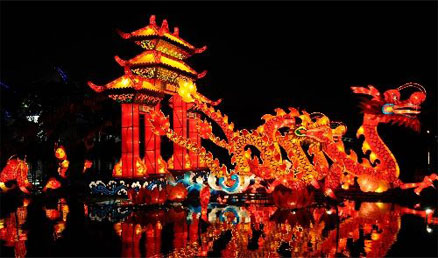
The “元宵节 (yuánxiāojié) Lantern Festival” is several days after the Spring Festival. The Lantern Festival, which falls on January 15th of the lunar calendar, is another important traditional festival in China. In the evening of that day, streets are decorated with lanterns and festoons and also filled with the sound of gongs and drums. Many people fill the streets with a merry spirit holding lanterns in their hands. There are a number of traditional activities that take place on the Lantern Festival, such the lighting of lanterns, lantern riddles and the dragon-lion dance. Let’s have a closer look!
“赏花灯(shǎnghuādēng), enjoying lanterns” on the Lantern Festival is a custom which has lasted for about 2000 years. In addition, lanterns symbolize brightness and the birth of a baby. Lighting a lantern means to illuminate the future. The Lantern Festival is also a romantic festival. In ancient China, young ladies were not allowed to go out by themselves, however, they could go out to enjoy themselves with friends on festivals. For single youngsters, to enjoy lanterns on Lantern Festival serves as a perfect opportunity to meet new friends. And now, many public recreational places like parks and squares will hold lantern themed performances. A great variety of brilliant and gorgeous lanterns will be on display.
Zhāng Líng: Yuánxiāojié chéngshì guángchǎng huì yǒu huādēngzhǎn, wǒmen yīqǐ qù shǎnghuādēng
张 玲: 元宵节 城市 广场 会 有 花灯展, 我们 一起 去 赏花灯
ba!
吧!
Zhang Ling: There will be a lantern show in the City Square on Lantern Festival, let’s go and have a look!
Lǐ Míng: Hǎode, nàtiān kěndìng tèbié rènao.
李 明: 好的, 那天 肯定 特别 热闹。
Li Ming: Ok. The celebrations must be very boisterous on that day.
“猜灯谜(cāidēngmí) guessing lantern riddles” is also called “打灯谜(dǎdēngmí)”. It is said that this custom originates from South Song Dynasty (AD1127—1279). On the evening of the festival, lantern owners would write down riddles on a piece of paper or a wooden plate and hang them below the colorful lanterns. If a visitor is able to solve the riddle, they can then pull the paper or wooden plate out and go to the lantern owners to check their answers. Since the riddles are both entertaining and instructive, they are popular with people of all types.
Zhāng Lì: Lǐ Huá, nǐ lái cāicāi zhèige dēngmí.
张 丽:李 华,你 来 猜猜 这个 灯谜。
Zhang Li: Li Hua, come here to have a look at this riddle.
Lǐ Huá: Liǎngxiōngdi, shǒulāshǒu, yígè zhuàn, yígè liú. Dǎ yī wénjù yòngpǐn?
李 华: 两兄弟, 手拉手, 一个 转,一个 留。打 一 文具 用品?
Li Hua: Two brothers, hand in hand, one turns round and another stands still. I guess it’s a kind of stationery?
Zhāng Lì: Cāidé chūlái shì shénme ma?
张 丽: 猜得 出来 是 什么 吗?
Zhang Li: Do you know the answer?
Lǐ Huá: Zhèige hěnróngyì ya, shì yuánguī! Gěi nǐ cāi zhèige, yīniánsìjì shì chūntiān, dǎ yī
李 华: 这个 很容易 呀,是 圆规! 给 你 猜 这个,一年四季 是 春天, 打 一
chéngshìmíng.
城市名。
Li Hua: A piece of cake! It is the compass! How about this one? It has spring for four seasons a year, guess the name of the city.
Zhāng Lì: En……wǒ háishì cāibùchūlái. Dá’àn shì shénme?
张丽: 嗯…… 我 还是 猜不出来。答案 是 什么?
Lǐ Huá: Shì Chángchūn.
李华: 是 长春。
Li Hua: It is Changchun. (the capital of Jilin Province in northeast China. In Chinese, one meaning of “长(cháng)” is “all the time” and “春(chūn)” is “spring”.)
“舞龙(wǔlóng), dragon dance”, also called “玩龙灯(wánlóngdēng) play dragon lantern”, is also a traditional activity of Lantern Festival. It is performed by a team of dancers who manipulate a long flexible figure of a dragon or using poles positioned at regular intervals along the length of the dragon. The dance team, led by a ball held by a dancer and in a sinuous, undulating manner, mimics the supposed movements of the dragon. People believe that dragons can control the clouds and rain and bring them a good harvest in the coming year.
“舞狮(wǔshī)” is a similar dance that where the performers mimic a lion’s movements. Lions are a kind of auspicious animals to Chinese. The lion dance shows people’s hope to get rid of misfortunes and their desire for good luck and happiness.
Lín Hóng: Wáng Méi, zuótiān yuánxiāojié nǐ qù nǎér wán le ya?
林 红: 王 梅, 昨天 元宵节 你 去 哪儿 玩 了 呀?
Lin Hong: Wang Mei, how did you spend the Lantern Festival yesterday?
Wáng Méi: Wǒ hé nǎinai qù le zhōngyāng gōngyuán, hái kàndào le wǔlóng wǔshī
王 梅:我 和 奶奶 去 了 中央 公园, 还 看到 了 舞龙 舞狮
de biáoyǎn, tèbié jīngcǎi o!
的 表演, 特别 精彩 哦!
Wang Mei: I went to the Central Park with my Grandma and we watched the dragon-lion dance there. It was amazing!

1. Which is not a traditional activity of the Lantern Festival?
A. Dragon dance.
B. Dragon boat race.
C. Lion dance.
2. What will people usually do in the evening to enjoy the Lantern Festival?
A. Go the lantern show.
B. Attend the lantern making competition.
C. Sing songs related to lanterns.
3. A lantern riddle:
Five brothers, live together,
With different names and of various heights.
A Clue is organ.
Chinese Culture
General Chinese (Beginner Level)
General Chinese (Intermediate Level)



